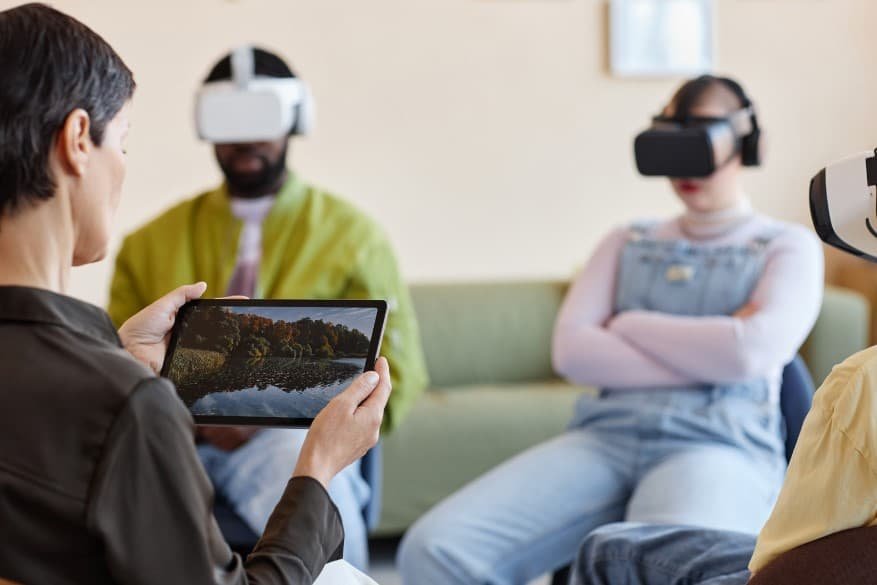The landscape of mental health care is evolving rapidly with the advent of virtual psychology. This transformative approach leverages technology to provide accessible, efficient, and effective mental health services. As we navigate through the 21st century, understanding the impact and potential of virtual psychology becomes essential for both practitioners and patients.
The Rise of Virtual Psychology
Virtual psychology, also known as online therapy or telepsychology, has surged in popularity due to its convenience and accessibility. This innovative mental health care solution enables individuals to receive therapy through digital platforms, such as video calls, chat services, and specialized apps. With the increasing prevalence of mental health issues globally, virtual psychology offers a viable alternative to traditional in-person therapy.
Benefits of Virtual Psychology
Accessibility and Convenience
One of the most significant advantages of virtual psychology is its accessibility. Individuals who live in remote areas or have mobility issues can now access mental health services without the need to travel. This convenience extends to those with busy schedules, making it easier to fit therapy sessions into their lives.
Cost-Effectiveness
Virtual psychology often proves to be more cost-effective than traditional therapy. Without the need for physical office space, therapists can reduce overhead costs, potentially passing these savings onto clients. Additionally, patients save on travel expenses and time.
Privacy and Comfort
Many individuals find it easier to open up about their mental health issues from the comfort of their own homes. Virtual sessions can provide a sense of privacy and security that may be harder to achieve in a face-to-face setting. This comfort can lead to more honest and productive therapy sessions.

The integration of AI and chatbots in virtual psychology has further enhanced its effectiveness. These technologies offer immediate support and personalized therapeutic exercises. Virtual reality is also making significant strides, especially in exposure therapy for phobias and PTSD. Mobile apps continue to support traditional therapy, providing tools like mood tracking and cognitive-behavioral therapy exercises. However, challenges such as the digital divide, confidentiality and security, and varying licensing regulations must be addressed to fully realize the potential of virtual psychology.
Technological Advancements in Virtual Psychology
AI and Chatbots
Artificial intelligence and chatbots are becoming integral to virtual psychology. These tools can provide immediate support, track progress, and even offer therapeutic exercises. AI-driven platforms can analyze user data to tailor interventions, making therapy more personalized and effective.
Virtual Reality
Virtual reality (VR) is another groundbreaking technology in mental health care. VR can create immersive environments for exposure therapy, which is particularly useful for treating phobias and PTSD. By simulating real-world scenarios in a controlled setting, patients can confront and overcome their fears safely.
Mobile Apps
Mobile apps dedicated to mental health are abundant. These apps offer various features, such as mood tracking, meditation guides, and cognitive-behavioral therapy (CBT) exercises. They provide continuous support and resources, complementing traditional therapy sessions.
Challenges and Considerations
Digital Divide
Despite its many benefits, virtual psychology faces challenges. The digital divide is a significant barrier, as not everyone has access to reliable internet or digital devices. Efforts must be made to ensure that these services are inclusive and available to all demographics.
Confidentiality and Security
Ensuring the confidentiality and security of virtual therapy sessions is paramount. Cybersecurity measures must be robust to protect sensitive patient information from breaches. Both therapists and patients need to be educated on best practices for maintaining privacy online.
Licensing and Regulation
Licensing and regulation pose another challenge. Therapists must navigate different state and country regulations to provide services across borders. Establishing standardized guidelines and policies is crucial for the seamless operation of virtual psychology.

Digital mental health services are evolving with virtual therapy and innovative mental health technology. Telehealth and remote therapy platforms, including therapy apps, are integral to this evolution. This wave of mental health innovation promises enhanced online mental health care. Tech in therapy is paving the way for future therapy solutions, making mental health support more accessible and effective.
The Future of Mental Health Care
Integration with Traditional Therapy
Virtual psychology is not likely to replace traditional therapy entirely but will serve as a complementary approach. Hybrid models, combining in-person and virtual sessions, can offer the best of both worlds. This integration allows for greater flexibility and tailored care plans.
Global Reach
The global reach of virtual psychology cannot be understated. It has the potential to democratize mental health care, making it accessible to underserved populations worldwide. As technology continues to advance, we can expect even more innovative solutions to emerge.
Continued Innovation
The field of virtual psychology is poised for continuous innovation. Emerging technologies like augmented reality (AR), biometric feedback, and advanced AI will further enhance the efficacy of virtual therapy. These advancements will contribute to more personalized and effective mental health care solutions.
Conclusion
Virtual psychology represents a significant shift in the mental health care landscape. Its accessibility, convenience, and potential for innovation make it a promising solution for the future. As we continue to embrace technology, the integration of virtual psychology into mainstream mental health care will likely become more prevalent. By addressing the challenges and leveraging the benefits, we can ensure that mental health services are more inclusive, effective, and accessible for all.
Discover the future of mental health care with East Coast Telepsychiatry with Adam Howell. Embrace the convenience and innovation of virtual psychology today.
